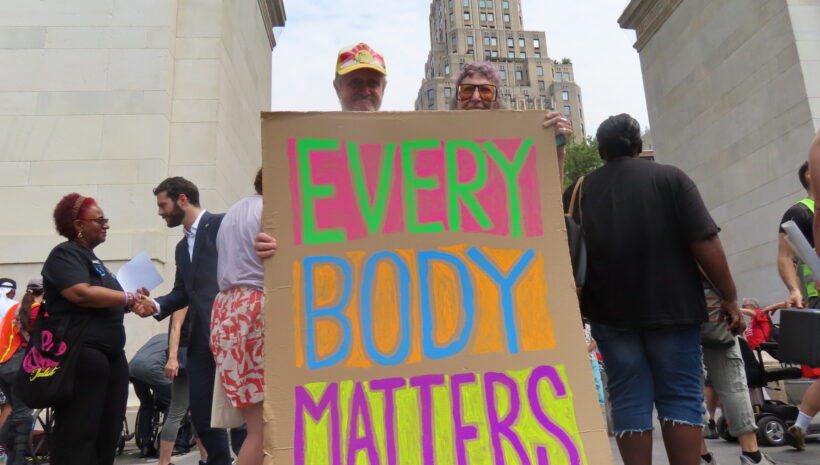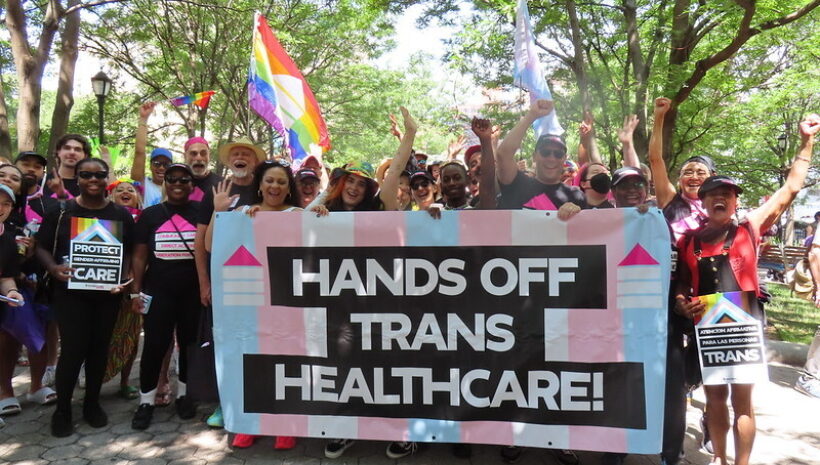Two Milestones, One Path
Two seemingly different milestones took place last week. On the surface, they may not seem especially connected to one another. The first was that the pioneering African-American memoirist, poet, dancer, performer, historian, and activist Maya Angelou passed away at the age of 86. The other was that actress and transgender advocate Laverne Cox became the first transgender person—not to mention the first transgender woman of color—to appear as the cover story of Time magazine, “The Transgender Tipping Point.” (The Time cover image appears at the end of this post.)
 That Maya Angelou participated and advocated long and hard in the civil rights struggle—as a writer, a performer, and also as an organizer—is fairly well known. As the only female editor of an Arab newspaper during her years living in Africa in the early 1960s, she depicted the continent’s growing anti-colonial movement, she met Nelson Mandela long before he became known as a South African freedom fighter, and she worked alongside both Malcolm X and Martin Luther King Jr. during the mid- to late 1960s.
That Maya Angelou participated and advocated long and hard in the civil rights struggle—as a writer, a performer, and also as an organizer—is fairly well known. As the only female editor of an Arab newspaper during her years living in Africa in the early 1960s, she depicted the continent’s growing anti-colonial movement, she met Nelson Mandela long before he became known as a South African freedom fighter, and she worked alongside both Malcolm X and Martin Luther King Jr. during the mid- to late 1960s.

What’s less widely known is that Angelou’s view of civil rights was expansive and inclusive, going beyond the struggles of African-Americans and Africans. She also marched alongside Gloria Steinem for women’s rights and was a vocal supporter of LGBT rights and personally lobbied legislators to support same-sex marriage. Perhaps most important of all, she recognized and she regarded fame and celebrity as megaphones for social justice, a useful platform by which she could broadcast and help the struggles and causes she believed in by drawing wider attention, and in turn empathy and engagement, to them.
Similarly, Laverne Cox has been a media trailblazer on multiple fronts, making TV history in 2008 when she became the first African-American trans woman to appear on a reality television program and making history again as the first African-American trans woman to produce and star in her own TV show, VH1’s critically acclaimed TRANSForm Me. She has come into the mainstream, public eye during the past year as a charismatic, talented performer via the ground-breaking hit show Orange is the New Black, on which Cox plays Sophia Burset, a transgender woman Netflix who is in prison for credit-card fraud. Although the role in and of itself is an artistic form of advocacy—in that it offers audiences an empathetic, three-dimensional human being who is a transgender person—Cox has not been content to limit herself to the performance forum when it comes to transgender advocacy. In the past 12 to 18 months alone, she’s done the following:
• She has returned to play the role of Sophia Burset for the second season of Orange is the New Black, which airs on June 6.
• She has been producing and participating in a still-in-progress documentary, FREE CeCe, a feature-length film about CeCe McDonald, a trans African-American woman who survived a violent, racist, and transphobic attack and served time in a men’s prison in Minnesota and using that story to bring attention to the larger, rarely reported issue of trans-misogyny and the patterns of violence experienced by trans women of color.
• She has traveled to Albany with Housing Works staff and volunteer advocates to lobby for transgender equality in New York State via the passage of GENDA (Gender Expression Non-Discrimination Act), an experience she wrote about in an op-ed that originally appeared in the Huffington Post.
_4_ejday.jpg)
• Ms. Cox has also been criss-crossing the country to give talks on a dizzying array of college campuses to educate and advocate to young people about the transgender community, the intersection of trans discrimination with racism and sexism, and the unique challenges trans people face every day. Her tour this past year included University of Georgia, University of Montana, Emerson College, Hamilton College, Hampshire College, UMass, UPenn, Old Dominion University, University of Florida, and many others, and from the looks of her speaking calendar, that advocacy work will continue throughout the rest of 2014 and into 2015.
• She has done countless high-profile media interviews, for both national magazines and TV shows, but even when the level of discourse on the part of the interviewers has been trite, narrow, and/or often sensationalistic, Cox has seized the moment as an opportunity to speak out and push back rather than be pigeon-holed into a one-dimensional diatribe about genitalia, transition, and surgery. A now-classic case-in-point is what happened on Katie Couric’s show just this past January. Cox was invited to be a guest on the show along with transgender model Carmen Carrera to discuss their rising careers, their future projects, and the visibility their success has brought to trans issues of social justice. The line of questioning by Couric, however, quickly devolved into an invasive focus on transition surgery and the private parts of her guests. Carrera rightly declined to answer, saying “I don’t want to talk about it, it’s really personal.” When Couric turned to Cox to push similar questions, Cox pushed back:
I do feel there is a preoccupation with that. The preoccupation with transition and surgery objectifies trans people. And then we don’t get to really deal with the real lived experiences. The reality of trans people’s lives is that so often we are targets of violence. We experience discrimination disproportionately to the rest of the community. Our unemployment rate is twice the national average; if you are a trans person of color, that rate is four times the national average. The homicide rate is highest among trans women. If we focus on transition, we don’t actually get to talk about those things.
Undaunted, Cox went on to talk about the recent murder of Islan Nettles, a 21-year-old trans woman, just one of many examples of the shocking rate of violence against trans people in the United States.
Advocates Who Walk the Walk & Show that Advocacy Works
The link between Angelou and Cox should be becoming more apparent at this point: It’s not simply that they are both examples of strong, outspoken African-American women, although they are. It’s that they walk the walk. By virtue of both word and action, their work in the world shares a deep, authentic commitment to using every outlet available to speak out and fight for social justice. And that the real definition of true advocacy is being in that commitment and living it for the long haul.
 The connecting of those dots for the AIDS Issues Update came through via an unusual source, an email letter sent out by Southern Poverty Law Center (SLPC) President Richard Cohen to SPLC’s supporters as a tribute to Maya Angelou’s lifetime dedication to social justice.
The connecting of those dots for the AIDS Issues Update came through via an unusual source, an email letter sent out by Southern Poverty Law Center (SLPC) President Richard Cohen to SPLC’s supporters as a tribute to Maya Angelou’s lifetime dedication to social justice.
In his letter, Cohen describes his experience of speaking with Angelou to ask her a favor: her permission to use Ben Harper’s song “I Rise,” which is a musical adaption of Angelou’s poem “Still I Rise” in a documentary film on anti-LGBT bullying (permission from Harper having already been granted). The plan for the film was for to be given way for free to every school in the country to combat the plague of anti-LGBT bullying that has been claiming so many lives. Cohen recalls her remarkable reply as follows:
“I’ll never forget her [Angelou’s] words. ‘Mr. Cohen,’ she said, ‘if you can’t be used, you’re useless.’”
It’s clear that Cox has taken her cues from the same playbook, and in that way, she and Angelou are both icons and models—possibility models, as Cox likes to say—for the importance and the effectiveness of advocacy work. If we insist on getting those stories about injustice out there and visible and are unswerving in our tenacity in creating change—in public understanding, in media coverage, in empathy, in visibility, in legislation—that brings about social justice, we can fight every social injustice in the book and make progress.
As indeed we must push on all those fronts because those fronts are related, especially in so far as it comes to the AIDS epidemic. We can and we must fight racism. We can and we must fight transphobia. We can and we must end poverty. We can and we must combat sexism and misogyny. We can and we must conquer homelessness and joblessness. We can and we must stop HIV stigma, and yes, yes, yes, we can and we must end the AIDS epidemic and achieve an AIDS-free world.
Now let’s get to work.
How You Can Help Support Housing Works Advocacy
 Support our advocacy work and donate to Housing Works today!
Support our advocacy work and donate to Housing Works today!
![]() Get AIDS Issues Update blogposts via email
Get AIDS Issues Update blogposts via email
![]() Like Housing Works on Facebook
Like Housing Works on Facebook
![]() Follow Housing Works on Twitter, @housingworks
Follow Housing Works on Twitter, @housingworks




